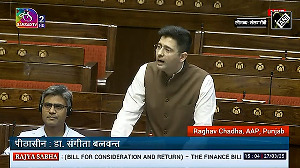
Eighteen years ago the Government of India signed a truce with the NSCN-IM to facilitate prolonged peace negotiations, which culminated in the August 3 peace accord. K Anurag reports.
The people of Nagaland hope that the peace accord signed between the Government of India and the Naga rebel groupm the Nationalist Socialist Council of Nagaland-IM on Monday, August 3, will last, unlike the Shillong Accord of November 1975.
Faced with bloodshed, economic underdevelopment and turf war among rival rebel groups, the Nagas have paid a heavy price for this peace.
The Shillong Accord, which was signed between the Government of India and Nagaland's underground government, then referred to as the Naga Federal government, was to accept the supremacy of the Constitution of India without condition and give up arms.
Nagaland's underground organisations were represented by several rebel leaders including Kevi Yalie -- the younger brother of A Z Phizo, the then president of the Naga National Council.
Phizo -- who lived in exile in London from 1956 till his death in 1990, aged 87 -- who sparked rebellion in Nagaland about six decades ago.
Many Naga rebel leaders, who were not ready to become part of the Indian Union of states, condemned the 1975 agreement that ultimately created factionalism among the rebels.
Five years after signing the accord, Isak Chisi Swu, then NNC vice-president, and Thuingaleng Muivah, then NNC general secretary, rejected the agreement, calling it a 'betrayal' by the NNC.
The rebel trio -- Muivah, Isak and S S Khaplang -- then formed the National Socialist Council of Nagaland, breaking away from the NNC on February 2, 1980.
By 1988, the NSCN further split on tribal lines into two different factions -- the NSCN (K), under the leadership of S S Khaplang (a Burmese origin Naga), and the NSCN (IM) under the leadership of Isak and Muivah.
After Phizo's death on April 30, 1990 in London, the NNC too split into two factions.
The NSCN-K led by Khalpang also split into two factions last year after two prominent leaders of the group -- Kitovi and Khole -- parted ways with S S Khaplang
Eighteen years ago the Government of India signed a truce with the NSCN-IM to facilitate prolonged peace negotiations, which culminated in the August 3 peace accord with the rebel group.
The government signed another ceasefire agreement with the NSCN-K in 2001, but the rebel group was not involved in the actual negotiations with the government which spoke only with the NSCN-IM.
Peeved at being ignored, the NSCN-K abrogated the ceasefire with the government in March this year and has since posed a threat to the uneasy peace in Nagaland.
IMAGE: Naga children watch the 58th anniversary of the unilateral day of independence ceremony at the Hebron Camp, Nagaland, August 14, 2005. Photograph: Adnan Abidi/Reuters









 © 2025
© 2025